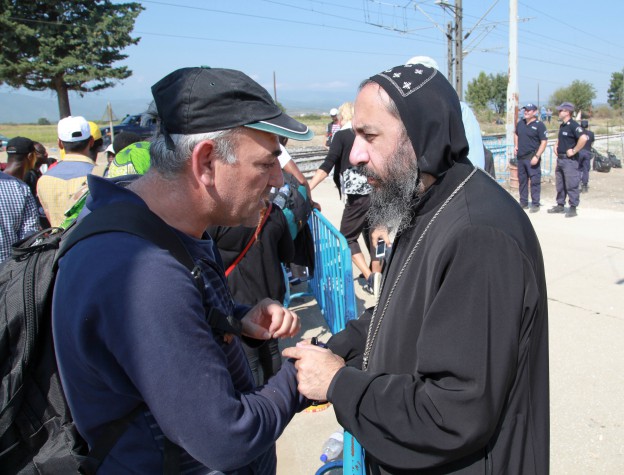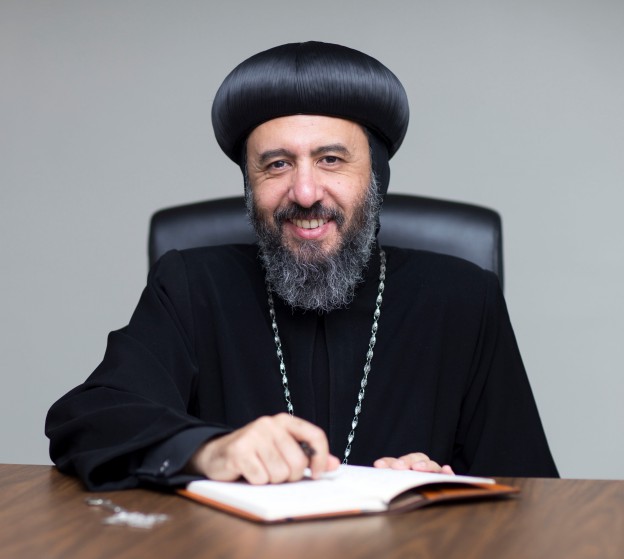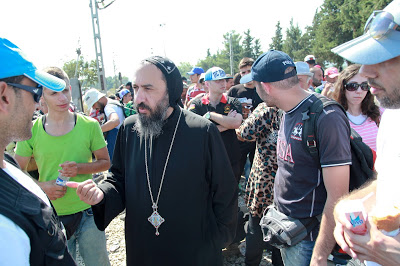View official statements and press releases via www.CopticMediaUK.com
Welcoming those less fortunate
By His Grace Bishop Angaelos,
General Bishop of the Coptic Orthodox Church in the United Kingdom
Until now, the Middle East crisis has been contained in that part of the world, and has, for some, become somewhat of a distant reality. If we have occasionally been moved by what we have seen or heard in reports, we have also had the relative comfort of being several steps removed from the situation. Now however, we are witnessing the movement of tens of thousands of desperate people fleeing that crisis and approaching the shores of Europe to seek refuge, and so the issue has become much more immediate and closer to home.
I have recently visited both refugee camps in Erbil and transit camps on the Greek-Macedonian (FYROM) border at Idomeni, and have therefore seen this humanitarian tragedy from both sides. This has provided an invaluable opportunity to personally meet and speak with many humanitarian aid workers and volunteers, as well as those in camps, and those making the dangerous journey. It has also further reinforced my view that this is a humanitarian crisis of a scale unseen since the Second World War, and that it can only be satisfactorily addressed, let alone resolved, through collaboration among and between states, NGOs and religious institutions.
During my visit to Idomeni it was painful to hear a young Syrian man say “…in Syria we are now used to quick deaths that come with bombs or shootings, but what we are experiencing in these journeys is a slow death.” The fact that these refugees willingly travel, sometimes with their children, in what they themselves call ‘death boats’ is proof of the desperate situations they are fleeing, and their struggle should not be belittled.
Along these journeys, vulnerable refugees, many of whom are children and minors, become easy prey for trafficking and organised crime gangs that exploit this vulnerability in a way that shames our humanity. We must therefore not close our ears to the cries of those who flee the horrors of their day-to-day existence in war-torn homelands to face even more horrific journeys. As more borders close, refugees who have already sacrificed almost everything will still find alternate routes because they have nothing to lose. In anticipation, we must collaborate to formulate a coherent and humane response and continue to protect those in greatest need while recognising and preserving their dignity.
As the United Kingdom prepares to welcome refugees from camps bordering Syria under the Government’s Vulnerable People Relocation Scheme (VPRS), it is imperative that we look at the whole issue of asylum with renewed insight. Until now, refugees have been considered by many as a potential burden and/or threat on and to our communities, and an additional drain on our economy. Looking with humane eyes however, we must realise that the majority of these vulnerable individuals have experienced immense suffering and loss and have not wanted to, but have been compelled to, leave their countries, communities, and all they have behind. Many have even more tragically also lost loved ones in this ongoing conflict.
The Prime Minister’s initiative to accept 20,000 refugees from camps bordering Syria over the next five years is welcomed, as it will indeed make a significant difference to those people and their families. While this is a start to solving a problem that is now of immense magnitude, we are also hopeful that these numbers will be revisited over time, and increased when possible to accommodate the ever-increasing flow of people fleeing conflict, war and persecution. As we see people come into the United Kingdom under this scheme or others, it is worth considering our outlook on the overall situation.
I was moved by the call of a senior figure within UNHCR Greece during my recent visit, who challenged us as Church leaders to make the teaching of Matthew 25 manifest: “Come, you blessed of My Father… for I was hungry and you gave Me food; I was thirsty and you gave Me drink; I was a stranger and you took Me in; I wasnaked and you clothed Me; I was sick and you visited Me; I was in prison and you came to Me.” This commandment is timeless and without exception, it applies today just as much as it did 2000 years ago when our Lord Jesus Christ Himself sought refuge in Egypt, fleeing adversity (Matthew 2:13).
As we do our utmost to serve those in great need, we pray for the millions currently displaced, those currently in refugee camps, and others who have embarked on treacherous journeys fleeing war and conflict; we also pray for policy makers, aid workers and volunteers who are dealing with this complex situation first-hand.
*Ends*
Find out more about His Grace’s visit to Greece via CTBI.org.uk


